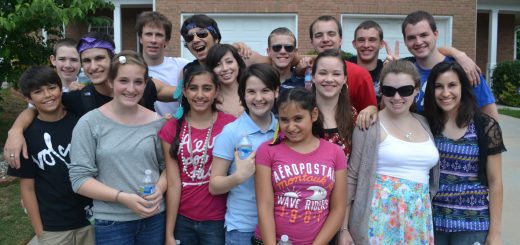Whose Time Is It Anyway?
Whose Time Is It Anyway? – June 18th, 2023
In the New Revised Standard Version of the Bible, which is the translation that my seminary recommends as the best one for biblical exegesis, there are 1008 mentions of the word “time.”
The first mention is in Genesis 3:8 where Adam and Eve “heard the sound of the Lord God walking in the garden at the time of the evening breeze.” The last mention is in Revelation 22:10 where the angel instructed St. John the Revelator, “Do not seal up the words of the prophecy of this book, for the time is near.” Perhaps the most well-known passage on time is in Ecclesiastes 3:1-8 – “For everything there is a season and a time for every matter under heaven: a time to be born and a time to die; a time to plant and a time to pluck up what is planted; a time to kill and a time to heal; a time to break down and a time to build up; a time to weep and a time to laugh; a time to mourn and a time to dance; a time to throw away stones and a time to gather stones together; a time to embrace and a time to refrain from embracing; a time to seek and a time to lose; a time to keep and a time to throw away; a time to tear and a time to sew; a time to keep silent and a time to speak; a time to love and a time to hate; a time for war and a time for peace.”
Time phrases abound in Scripture: “my time is near”, “set time”, “in the course of time”, “the fullness of time”, “harvest time”, “signs of the times”, “the time is fulfilled”, and many more. There are also many time-related measurements – age, year, month, week, day, hour, minute, and so on. Beyond those there are innumerable occurrences of time-related prepositions like after, later, ago, before, by, until, during, while, for, to, till, on, in, at, past, since, soon, long . . . the list goes on.
I think it’s safe to say that we are well and truly situated in and limited by time. To be in time is to be a part of creation. Science fiction writers like to suggest that there are ways to get around the linear nature of time, and it’s entertaining to engage our imaginations in that kind of thing. But in reality, God is the only one who transcends time as the Creator of time and of everything else there is. One of the great miracles and mysteries of God is that when he came to us as fully God and fully human in the person of Jesus Christ, he chose to enter time with us.
Our World in Data, a website that offers statistics on all kinds of things, says that the average adult in our country spends their time each day as follows:
- Education: 31 minutes
- Seeing friends: 44 minutes
- Personal care: 57 minutes
- Eating and drinking: 1 hour and 3 minutes
- Care work or Volunteering: 1 hour and 36 minutes
- Leisure beyond shows and friends: 1 hour and 40 minutes
- Housework and Shopping: 2 hours and 2 minutes
- TV and radio: 2 hours and 28 minutes
- Paid work: 4 hours and 11 minutes
- Sleep: 8 hours and 48 minutes
If you add those hours and minutes up, the total, unsurprisingly, comes to 24 hours.
The book, What We Really Do All Day says that people self-report their least enjoyable activities as homework, job-seeking, schooling, commuting, and paid work. People self-report their most enjoyable activities as concerts, sports, games, eating out, sleeping, and religious acts.
Time. Every person gets the same amount of time each day. Occasionally we feel like we’ve gained another hour, like when we “fall back” after daylight savings time or we cross the International Dateline. But we lose that hour when we “spring forward” or make our return journey. In the twenty-four hours we are given each day, we all face limitations and obligations. But each and every day, we are given choices as to how we make use of the time we’ve been given. Today we’re going to consider this question, “Whose time is it anyway?”
First, let’s look at Jesus, always a good place to start. How did Jesus spend his twenty-four hours each day? I think that if someone told us that God, the Creator of all that there is, was going to come in human form – Messiah – to proclaim and demonstrate God’s plan to renew and restore all people and all of creation, we might guess that this Messiah would hang around for a long time. Renewal and restoration takes time even for Jesus, who emptied himself of his divine privileges and took on the limitations of being fully human. His best mode of transportation was his own two feet and an occasional donkey. Queen Elizabeth II, who recently passed away, was on her throne for 70 years. Surely the Messiah would come for at least that long? We know now, in retrospect, that Jesus’s public ministry would last for three years. Three years – that’s 1095 days. Assuming that Jesus got about eight hours sleep each night, that means he had about 17,500 waking hours to do what he came to do. The population of the world at the time was estimated to be between 170 and 400 million. At best, that means that if Jesus were to interact with every person on the planet, he would have needed to spend time with 10,000 people per hour, which is about three people per second. Silly calculations, right? My point is that even if all of the people on earth were to line up and just walk briskly past Jesus, because he was both fully God and fully human, he wouldn’t have been able to tend to each person’s needs in the amount of time he had during his time on earth. Do you think that was maybe the way God meant it to be?
Let’s turn to Psalm 23, a familiar passage, and read it from the perspective of “Whose time is it anyway?” Let’s pay special attention to words pertaining to the passage of time:
Psalm 23:1-5 (NRSV) – “The Lord is my shepherd; I shall not want. He makes me lie down in green pastures; he leads me beside still waters; he restores my soul. He leads me in right paths for his name’s sake. Even though I walk through the darkest valley, I fear no evil, for you are with me; your rod and your staff, they comfort me. You prepare a table before me in the presence of my enemies; you anoint my head with oil; my cup overflows.”
The first time-related thing we might notice in these first five verses is that they are all written in the present tense. “The Lord is my shepherd.” “He leads me.” “You are with me.” “You prepare a table before me.” “My cup overflows.”
And then we come to verse 6, the final verse: “Surely goodness and mercy shall follow me all the days of my life, and I shall dwell in the house of the Lord my whole life long.” Notice that it does not say, “surely goodness and mercy shall follow me on the days of my life when I do everything perfectly” or “on the days of my life when I feel good about myself” or “on the days when I spend all of my time wisely” or “on the days of my life when other people notice what I’ve done.” No, it simply says “all the days of my life” and goes on to conclude, “I shall dwell in the house of the Lord my whole life long.”
God’s love and goodness are unconditional. It is the goodness of God and only the goodness of God that can and does set us free from three areas of great temptation, which I’ve made into an acronym – FLU – we want to avoid these like the plague!
- Fears (which often present themselves in anxiety or worry) that threaten to overwhelm us. “I’m running out of time.”
- Lack, our feeling like no matter what we have, it’s not enough or we’re not enough. “If only I had more time.”
- Unattachment, our thinking that we can pull ourselves up by our own bootstraps and kid ourselves and others that we’re ok. “If I had just a little more time, I’d be able to fix this.”
Whose time is it anyway? The cure for our FLU, our fears, lack, and unattachment, is surrender, surrender to our Creator who is always good, always present, always able. Our time is not our own. In Psalm 31:14-15a, David writes – “I trust in you, O Lord; I say, ‘You are my God.’ My times are in your hand.” Do you fear that you’re running out of time to <fill-in-the-blank>? Surrender your time to God. Are you feeling that you lack the time to <fill-in-the-blank>? Surrender your time to God. Are you unattached from God or from others and think you’ll be able to fix <fill-in-the-blank> with just a little more time? Surrender your time to God. God cares deeply for each one of us and he cares deeply for each year, month, week, day, hour, and moment of our time. In Christ, God has come to be with us, in time. Here and now.
It’s good to remember that God created us for relationship, just as God is Trinity in Unity, the Father, Son, and Holy Spirit, in a continual, communal explosion of love for one another. When God created us humans, he invited us into that love relationship. If we look at that Genesis verse we touched on earlier and the verse after it (Genesis 3:8-9), we read: “They heard the sound of the Lord God walking in the garden at the time of the evening breeze, and the man and his wife hid themselves from the presence of the Lord God among the trees of the garden. But the Lord God called to the man and said to him, ‘Where are you?’” Get that – God walked in the garden and looked for his image-bearers (humans), the ones he loved and adored above all of creation, to walk together with them. This is what God intended for us to do – to walk together with him in his beautiful garden and to get to know him in his goodness. What would it look like for us today to surrender our time to the Lord and walk with him in the garden of his goodness?
God has given us all that we need, including all of the time we need to do whatever it is that he’s put us on the earth to do. God’s not standing over us like a frustrated coach with a stopwatch or an angry boss with a fist yelling at us to do more, go faster, squeeze every drop out of our days. Jesus is the True Vine and Father God is the Gardener. Jesus is also the Good Shepherd who invites us to walk with him in his pastures of provision. He invites us to lie down and rest. He invites us to allow him to heal and restore us. We all get out of balance, off track, and worn out sometimes.
You know, when we read the Bible, God invites us to engage with the capital W Word, not as just a book, but as Christ himself, who is The Word, as John tells us in John 1:1. God invites us to engage with living and active Word of God that, as Hebrews 4:12 says, “is sharper than any two-edged sword, piercing until it divides soul from spirit, joints from marrow; it is able to judge the thoughts and intentions of the heart.” Jesus is the Great Surgeon. God invites us to present our lives to him and allow him, the Great Surgeon, who is fully competent and fully kind, to skillfully do whatever is needed to make us whole and healthy. Sometimes he slices out malignant growth, sometimes he gives us a transfusion, sometimes he transplants in new parts, sometimes he sews us up. Our job is to surrender to and trust the goodness and greatness of the Surgeon. If we give over the controls of our lives to God, if we let him do what needs to be done as only he knows, we’ll be on the path to healing. God invites us to enter into his rest in every part of our lives, including how we spend our time. Whose time is it anyway?
Jesus didn’t come here to fix everything and everyone and then leave. As we saw earlier, God sent Jesus here for a period of time that was exactly long enough to do what he needed to do. Jesus himself said that he did what he saw Father God doing. Jesus didn’t stress over the things he didn’t have time to do or the people he didn’t have time to heal. Jesus came to launch the Kingdom of God, to announce its arrival, to demonstrate it through signs and wonders, to teach us how to do what he did, and to give us the power to follow him by giving us the Holy Spirit. He lit the fire and said in essence, here, now follow me and do what I’ve done. I’m with you, in time, always!
So what did a typical day in Jesus’s life look like? I decided to step through the gospel of Matthew and see what I could find. You might want to do this with one of the other gospels – I’d love to hear more about what you discover!
On one particular day, Jesus gave what we call “The Sermon on the Mount,” leaving people amazed at his teaching and real authority. Later that same day Jesus healed a man with leprosy, a Centurion’s young servant, and Peter’s mother-in-law. Was that a typical day for Jesus?
On another day, Jesus talked to John the Baptist’s disciples, healed a woman who had suffered for twelve years with constant bleeding, raised a synagogue leader’s daughter from the dead, healed two blind men, and cast out a demon from a man who couldn’t speak. Was that a typical day for Jesus?
On another day, some Pharisees protested to Jesus that his disciples were breaking the law by harvesting grain on the Sabbath, and then Jesus explained his Lordship to them and on that same Sabbath went on to heal a man’s hand. Was that a typical day for Jesus?
On another day, as Jesus was grieving the death of John the Baptist and tried to be alone in his grief, a huge crowd followed him and he healed their sick, fed more than 5000 people, walked on water, let Peter walk on water, climbed back into a boat, calmed the wind and waves, and once on shore again he healed all who touched him. Was that a typical day for Jesus?
On another day, Jesus told Peter to catch a fish to find a large silver coin that would cover the Temple tax for them both. Was that a typical day for Jesus?
I want to suggest that living as Jesus did means that no two days are going to look exactly the same. One thing’s for sure – each day that we live as Jesus did is a never-to-be-repeated adventure. The adventure part is that whenever Jesus is present, light overtakes darkness, peace overtakes chaos, love overtakes hate, life overtakes death. And if you’ve surrendered your life to Christ, then Christ, the hope of the world, is in you – you are a carrier of the presence of Christ. So, wherever you are, Jesus is present.
We all enjoy a good story, don’t we? Jesus not only told a lot of great stories which we call parables, which help us so much to understand what God is like. More than that, they help us to understand what God intends for us. Jesus invites each one of us to participate in the best story of all, God’s story, God’s mission to rescue, renew, and transform all of humanity and all of creation. This is the good news, the great adventure, the Kingdom of God to which Jesus invites us.
Jesus didn’t say, “Come, follow these rules” but “Come, follow me.” Whose time is it anyway? If my time belongs to me, I’m going to be limited to whatever I can control (hint: that’s not much). If my time belongs to God, I’m going to experience the abundant and thriving life that God promises.
What would it look like to surrender my time to Jesus? What would it look like to give Jesus control of my time? Is there some part of my time that I’ve been reluctant to give over to the King?
Whose time is it anyway?




